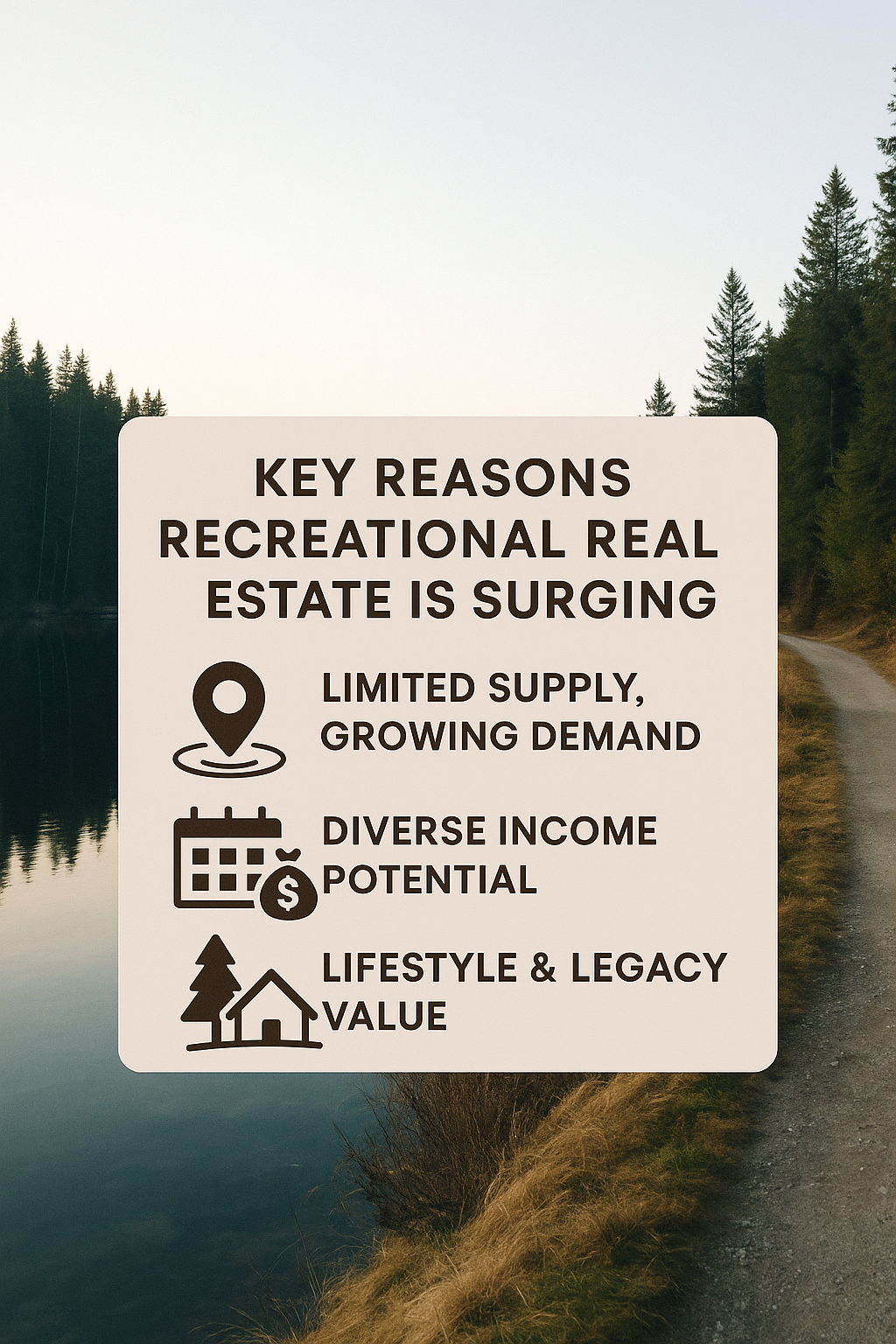Why Recreational Real Estate Is the Next Big Investment
Introduction
Real estate investing has always been a trusted way to build wealth, but a new trend is drawing serious attention: recreational real estate. From hunting parcels and fishing cabins to mountain getaways and off-grid homesteads, recreational land offers lifestyle perks and financial growth potential. Here’s why this sector is emerging as the next big opportunity for investors.
Key Reasons Recreational Real Estate Is Surging
Limited Supply, Growing Demand
Outdoor recreation is expanding nationwide. With more people seeking weekend retreats and rural escapes, quality recreational properties remain limited—driving prices upward.Diverse Income Potential
Investors can generate revenue through short-term rentals, hunting leases, farming or timber rights, and event hosting. Multiple income streams help offset holding costs.Lifestyle & Legacy Value
Unlike traditional rentals or commercial properties, recreational land provides immediate lifestyle benefits—family retreats, outdoor sports, or future retirement homes—while serving as a long-term legacy asset.Hedge Against Inflation
Land has historically held or increased its value during inflationary periods. Recreational parcels often outperform urban properties when city markets cool.
What Makes Recreational Real Estate Different
1. Land Appreciation with Lifestyle Appeal
Unlike vacant urban lots, recreational land’s appeal grows with outdoor trends. National and state park traffic is at all-time highs, and people want private space near these destinations.
2. Flexible Use and Zoning
Many recreational properties allow multiple uses—camping, cabins, off-grid living—without the strict zoning rules of city lots. This flexibility supports creative, higher-value development.
3. Remote Work Compatibility
With more professionals working remotely, buyers are looking for rural land where they can work part-time and play full-time. Internet and solar options make this easier than ever.
4. Environmental and Conservation Incentives
Conservation easements, carbon credits, or tax breaks for land stewardship can add financial benefits while protecting natural resources.
Four Smart Ways to Invest
1. Short-Term Rentals
Build or place cabins, yurts, or tiny homes for vacation rentals. Nature-based lodging demand is rising, and nightly rates often beat urban Airbnb properties.
2. Hunting & Fishing Leases
If the property includes wildlife habitat or water access, annual leases to hunting or fishing clubs can generate steady income with minimal management.
3. Agriculture or Timber Rights
Some recreational parcels support grazing, orchards, or managed timber harvest, adding an agricultural revenue stream.
4. Buy-and-Hold Appreciation
Even without improvements, well-located land near recreation hotspots typically appreciates as population and outdoor tourism increase.
Key Considerations Before Buying
Location & Access
Check proximity to highways, towns, and recreation areas. Seasonal road closures or difficult terrain affect usability and value.
Water & Utilities
Understand water rights, well permits, and off-grid power options. Properties with proven water sources or solar potential often sell faster.
Zoning & Easements
Verify that zoning supports your intended use—cabins, RVs, or rentals—and review any conservation or utility easements.
Financing Options
Many recreational properties qualify for owner financing, which can make purchases easier without traditional bank loans.
FAQ: Recreational Real Estate Investments
Q: Is recreational land riskier than residential rentals?
A: It carries different risks—like weather or access—but lower tenant turnover and simpler maintenance often offset those concerns.
Q: How much land do I need?
A: Even 5–10 acres can work for private getaways or small rentals. Larger parcels appeal to hunters and long-term conservation buyers.
Q: What is the typical ROI?
A: Returns vary by location and use, but steady appreciation plus income streams from rentals or leases can outpace traditional rentals.
Q: Can I get a loan for raw land?
A: Yes, but terms differ. Many sellers offer owner financing with flexible down payments and shorter approval timelines.
Why Choose Mountains West Ranches (or Your Company Name)
If you’re ready to invest in recreational land, working with a dedicated recreational real estate company matters. We focus exclusively on rural properties, understand zoning and water rights, and offer owner-financing options to help you purchase with confidence.


